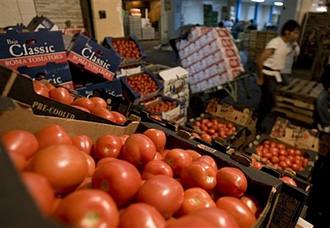
|
 |
 |
 Business News | June 2008 Business News | June 2008  
Salmonella Fear Traps Tomatoes in Mexico
 Olga R. Rodriguez - Associated Press Olga R. Rodriguez - Associated Press
go to original


| | Tomatoes sit for sale in the Central de Abastos market in Mexico City, Thursday, June 12, 2008. Export-quality tomatoes labeled 'Ready to Eat' in English flooded Mexico City markets on Thursday after a salmonella scare in the U.S. stopped them from crossing the border. (AP/Eduardo Verdugo) | | |
Mexico City - Export-quality tomatoes labeled "Ready to Eat" in English flooded Mexico City markets on Thursday after a salmonella scare in the U.S. trapped them south of the border.

The U.S. Food and Drug Administration has warned consumers against three types of raw tomatoes that have sickened 228 people in 23 states since mid-April. It has not pinpointed the outbreak's source, but cleared imports from six countries — though not from Mexico, which supplies 80 percent of tomatoes imported into the U.S.

Tomatoes from several counties in Florida are also under suspicion, the FDA said.

Mexican growers and government officials called the warning unjust, noting it has brought exports to a halt and could cripple Mexico's $1 billion tomato industry. The U.S. has no proof that any contaminated tomatoes were from Mexico, they say.

"What we hope is that they finish their investigation soon" and clear the Mexican fruit, Agriculture Secretary Alberto Cardenas said Thursday. "Mexican tomatoes are clean."

A delegation of Mexican officials flew to Washington D.C. on Thursday to help the FDA find the source of the outbreak, Cardenas added.

Mexican tomato growers say their produce is subject to double the scrutiny that U.S. tomatoes face: inspected first by Mexican officials and then again at the border when crossing into the U.S.

But some U.S. consumers already associate the outbreak with Mexican produce, and stopped buying the fruit this week.

"We can't sell a single box of tomatoes," said Jesus Macias, sales manager at the Productora Agricola Industrial del Noreste, a tomato grower that normally ships 50,000 boxes of tomatoes a day to an importer in Chula Vista, California.

Instead, he now sends his top quality tomatoes to markets around Mexico where they sell for a third the U.S. price. He leaves lesser-quality produce, normally sold in Mexico, to rot.

At the capital's bustling central food market, truckloads of tomatoes are now arriving in boxes originally meant for the U.S. "Sweet treat. Premium quality," says lettering in English — wording lost on most Mexican Spanish speakers.

The top quality tomatoes now sell for 35 cents a pound (8 pesos per kilogram) in the capital — a third below normal prices.

Most customers don't know about the U.S. salmonella scare, and those who do, don't seem alarmed. Some shoppers said they've always been more careful than Americans in preparing produce — they have to be, because vegetables sold in Mexico are not held to the same standards as those certified for export.

"What ends up here is second-rate," said Sergio Martinez, a 40-year-old bricklayer who bought 4 1/2 pounds of tomatoes at the central market Thursday.

"Almost all vegetables are contaminated with something because they water them with sewer water and put on a lot of chemicals," he said, noting that he washes all his produce with bleach and water.

About 120,000 people were sickened by salmonella in Mexico last year, according to Mexican health authorities — three times the average 40,000 cases reported in the U.S., according to the U.S. Centers for Disease Control and Prevention.

Still, Mexican growers certified by the FDA to send their tomatoes to the U.S. must meet the same requirements as U.S. farmers. Their fields are irrigated with fresh water, workers at packing plants wear head-to-toe sterile clothing, and inspectors follow the fruit from field to truck.

"The gringos are really demanding about quality," said Ricardo Montiel, 41, who was selling tomatoes, apples and avocados from his stand in Mexico City's largest food market.

"But the problem didn't originate here. It is as easy as looking around and seeing that people haven't gotten sick." | 
 | |
 |



